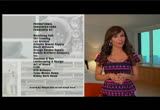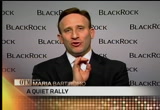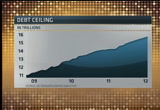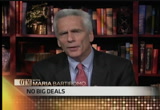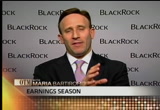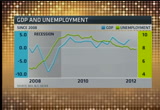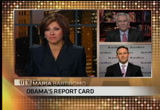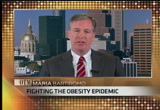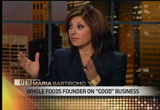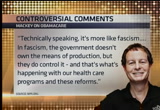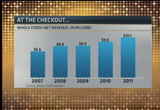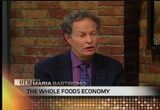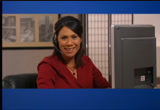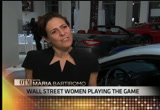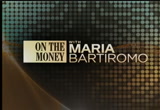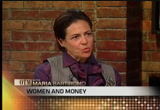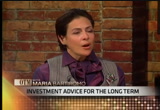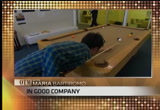tv On the Money With Maria Bartiromo NBC January 20, 2013 2:30am-3:00am EST
2:30 am
hi, everybody. welcome to westbound. i'm maria bartiromo. the money hit five-year high. is the rally surreal and is it too late to get? what barack obama has done right and wrong over the last four years. plus, food for thought. the ceo says obama care is a form of fascism. will the crunchy consumers of whole foods? and know when to hold them and when to fold them. poker faces for women in the business world and learning how to do it firsthand. "on the money" begins right now. this is america's number one financial news program, "on the money." now, maria bartiromo. >> here's what's making news as
2:31 am
we head into a new week "on the money." the stock market market rally keeps powering forward and the major indeesices are hat five-y highs. the markets have been powered by so much money on the sidelines new money coming so the market at the beginning of the year as well as encouraging economic news and just a lack of bad news when it comes to earnings. stocks kept on climbing on friday. lots of earnings news for big financial companies this week. goldman sachs blew past expectations. bank of america finished ahead of predictions, so did morgan stanley. jpmorgan chase beat expectations but cut ceo jamie dimon's composition in half to $11 million because of the so-called london well trade which cost the bank $6 billion. retail sales were up more than expected in december, up half a percent. they ignored worries about higher taxes. consumption makes up 70% of the
2:32 am
u.s. economic growth. the debt ceiling debate, presidential report card and quiet market rally. what does it mean for you money? joining us right now, jared bernstein, center on budget and policy priorities and chief economist to vice president biden. also with us, russ koesterich. thanks for joining us. >> thanks, maria. >> russ, let me kick it up with you. a pretty good rally. on thursday the s&p 500 hitting yet another five-year high. is this rally for real? do you think it's sustainable going forward as we continue through this earnings period? >> i think in the short term, it is. i think we're probably going to hit a road bump in february. the reason i say that is we've got a lot of flows coming into the market early in the year. people were nervous in december. they're coming back in to stocks. that's a good thing over the longer term. we do have some issues coming up. the debt ceiling obviously one of them. the second question is we start to get the economic data. how big of a hit from the tax
2:33 am
increaseses, payroll tax holiday, and what do those numbers which may be a bit on the soft side do to stocks? >> absolutely. that is the question of the day, isn't it, jared. the ceiling debate, the u.s. set to hit that $16 trillion limit on borrowing in the next month if we haven't hit it yet. let's take a listen to what president obama had to say about the potential battle looming in congress. >> markets could go haywire, interest rates would spike for anybody who borrows money. every homeowner with a mortgage, every student with a college loan, every small business own whole wants to grow and hire. >> jared, how does this play out? >> well, we're beginning to hear lots of sounds from republicans that we're in a compromising mode than we heard, say, a week ago. right now they're talking about perhaps an increase in the debt ceiling that lasts for a couple of months, that is offering that to the president. frankly, and russ say agree with me here, i don't think markets would react to -- very
2:34 am
approvingly to basically just another lurch from crisis to crisis. it wasn't too long ago that, maria, you and i were sitting in these chairs talking about the fiscal cliff. now the debt ceiling. do you want to have this discussion two months from now? >> i believe everybody believes this debt ceiling will be extended. you know these guys well. you worked right there with vice president biden. let me get your take on this. if we keep fighting about spending cuts and reining in the spending, how come it's always about putting the gloves on and fighting? we're not going to do this, we're not going to do that. how come we haven't seen any proposals for spending cuts? are we going to see that, you think? >> i do think so. i mean, i think that we have to go through this unfortunately, at least recent history suggests we have to go through this crisis mentality to get there. i will say this, and we shouldn't forget it. thus far, there's been $1.5 trillion in spending cuts that have been made. they're on the books. there's been $600 billion in tax increases. made, on the books.
2:35 am
sos that over $2 trillion in deficit reduction in two years. it doesn't get us all of the way there but largely, two thirds of the way there at least within a ten-year budget window. >> russ, what do you think? of course we are approaching this with caution. we know that there's going to be more back and forth. but in the middle of it all, we've got earnings season. and you know, already some people are saying that this anticipation of all of these cliffs, cliff after cliff, has already impacted the earnings period. what are you looking at, what are you seeing from the fourth quarter reporting season so far? it's been a big week obviously this week for financials. >> we're seeing decent performance. again, i think compliments to corporate america because they been able to grind out strong earnings growth with a relatively weak recovery. and margins remain much higher than people thought and this has helped. we are seeing recovery in the rest of the world, and that has helped. it's going to be a decent year. i don't think the problem is the trajectory of the economy. i think the question is how much will these issues from washington, whether it's the
2:36 am
debt ceiling, the sequester, the lingering uncertainty over the long-term budget picture undermine confidence, lower the valuations of u.s. companies because people just have less confidence in long-term trajectory. >> jared, president obama starts his second term next week. his inauguration, of course, monday. what has he done right in the last four years, in your view, what could he have done better or has he done wrong? >> four years ago right around this time when i was a member of the administration's economic team i was remembering just the juks of position about the great hope and expectations and just the real horror of what was going on in macro economy. gdp contracting at 9%, losing 700, 800,000 jobs per month. i think the president came in and hit very hard and broke the back of the great recession a lot sooner than people expected, certainly the financial markets were reflated much more quickly than -- and at less ek pence
2:37 am
than people expected. and pretty soon, really by the second half of 2009 gdp was growing and it's been growing since. i think on the other side you have some things that haven't gone as well. i think the president is great at explaining his vision. i think he has yet to really kind of explain with a grind of granule larity about what he's up to day to day particularly around the economy in ways that you may recall bill clinton did so effectively at the convention. i also think that politically, you know, the president doesn't quite like to mix it up in these deals the way, say, his vice president i think very effectively does and i think that that's something that would be good to work on in the second term. >> it's great analysis. russ, what about investors at this point? what should we be doing with our money at this point? smaller countries, why is that and how do you get a piece of that growth? >> i think the outlet for the u.s., i think we're going to
2:38 am
have a decent year. it may not be great because of the fiscal drag. but i'm confident that the u.s. economy will expand. the question is just what do you pay for that? and as you know, we've been advocating more of a position internationally and the argument there is not that there aren't problems in emerging markets or europe but that their problems are better reflected in the price. the s&p 500 trades at a price to book about 2.2. it's roughly half that level in europe. >> gentlemen, thank you. >> thank you. >> see you soon. appreciate your time tonight, russ koesterich and jared bernstein. up next, we're "on the money" and on the shopping list. whole foods co-founder and c erk o john mackey joins us as we talk groceries. later, how is your poker face? some women in business are unleashing their inner cardsharp as they're facing off. that's no bluff as we take a look at how the stock market ended the week.
2:41 am
i think that would be a grave mistake. i don't think that would solve anything. i know they're going to try it, and how far they will go with that game of chicken, i have no idea. >> one thing the public should understand is we're not afraid of anyone, we're not afraid to bring any kind of case against nino matter how big they are, how wealthy they are or how prominent they are. sometimes it takes a while to build those cases. >> too often the debate becomes so simplistic. don't drink soda and somehow the ebeastie city will go away. we know we haven't. but we want to be part of the solution. >> part of the conversation world n. world today, business and politics this week, a healthy lifestyle is part of the mission. and business outlook of my next guest, john mackey is the co-ceo
2:42 am
and co-founder of whole foods as well as the author of "conscious capitalism. john, good to have you on the program. thank you for joining us. kig it off here with that comment about business. why do you think business is heroic? >> business is the greatest value creator in the world. it has -- it creates value for its customers, for its employees, for its suppliers, for its investors, for the community that it's part of. it doesn't get credit for that. the narrative about business has been hijacked by the critics and its enemies. it's portrayed as selfish, greedy, and exploitative. when, in fact, it's helping to lift humanity up to higher -- eliminate poverty and lifting humanity up to higher levels of prosperity. it's good. it's heroic. >> i'm so glad you said that. i completely agree. it doesn't get the credit. you're absolutely right. i want to talk about the value you create with whole foods for sure. let me stay on the book for a moment because in the book you discuss keeping all the stakeholders well. investors, employees, consumers. how do you balance healthy
2:43 am
business with that mission? isn't it impossible to please everybody all the time? how do you do it? >> it's not always easy but i don't think it's really about balancing it. that kind of implies that there's tradeoffs. the conscious business creates strategies where all of the stakeholders are winning simultaneously. it's a failure of imagination and creativity. a conscious business figures out ways to avoid those tradeoffs. >> you've made some public comments about health care reform. i want to talk about this because i speak to a lot of ceos all the time and the affordable care act issing? they can't to say is way too expensive, impacting your business. earlier this week you likened the affordable care act to fascism. comments you pedalled away from saying it was a poor choice of words. what did you mean? talk to us about what you were trying to articulate. >> poor choice of words because it has so much emotional baggage for people due to the stuff in world war ii. but what i was trying to
2:44 am
articulate is we're moving away from free enterprise capital lymph, which allows innovation, experimentation, creativity, allows the marketplace to create progress in health care, to more and more government controls, which will bog it down in bureaucracy, raise cost, not produce the progress that we need in health care. >> what impact does this reform have on your business? >> it's raising cost. it's the opposite of being affordable health care because it's making it more expensive for businesses like whole foods and, as a result, that's less money that we have to pay our team members for wages or other benefits. the health insurance just grows as a percentage of what the total compensation that we're paying people is. >> i know you've been very thoughtful about this subject. you've been ceo since 1980. the company has done very well. you're offering coverage to employees working more than 30 hours a week. you see tremendous growth. your stock up more than 1,000%
2:45 am
since the wost worst of the financial crisis. tell me about the consumers' attitudes about foods. has it changed over this time, the cost, the sourceses of their food. what kind of sentiment changes have you seen from your customers? >> yeah, lots of different trends in this society. so there's definitely a trend towards health year eating. americans are now 69% overwei t overweight. 36% obese. 80% of health care dollars in lifestyle diseases, cancer, diabetes. there is a trend towards healthier eating. >> all preventable, by the way. >> that's right. also a trend, of course, toward more junk food. we have different trends in this socie society. of course, my business focuses on the healthier trend. that's what we're trying to do is help america to eat healthier and live longer. >> you know so much about this. how do you eat? are you a vegan? >> i am a vegan, yes. ten years now. no oil vegan. try to avoid eating processed foods like sugar and white
2:46 am
flour. that's worked very well for me. i very seldom get work. feel great. feel better today at 59 than i felt really when i was 39. >> isn't that wonderful? >> it is. >> some people question whether or not organic is worth it. is organic worth the extra money? >> i think that it is. it's definitely better for the environment. lowers your risk of pesticides in the ground water, pesticides in our own bodies, so i think that's a good thing. >> john, it's great to have you on the program. >> it's great to be here, maria. >> thank you so much, john mackey joining us. next up, we're "on the money." why women and gambling may make a better combination in business than you realize. the power of poker to boot the
2:49 am
i am a poker player. and there is really nothing greater than walking into a poker room in las vegas full of men. reminds me of my first job at merrill lynch. i think women do a few things better than men. they have better tuition and have a better poker face. women can do better in money in something that is traditionally a man's world. >> it started with clients and perspective clients. it started as a fun networking group. >> wow. >> see who the very passive ones are. you learn a lot about other people went you're playing this game. >> there are ceos here.
2:50 am
there are women who sold companies for $100 million. there are women who go through very public divorces who need skills. >> you need to be good at the poker table. >> 50% of it for me is watching and shaking people down. >> half of this game is reading the table. >> so does knowing when to hold them and now when to fold them bake more better business women? alexandra lebenthal made a series for women's poker night in new york. thanks so much for joining us. so why poker? what's the payoff for a ladies poker night? >> it's all about the poker face. i say that with no joke. although, i actually have a terrible poker face, for those who know me. but it's really about the negotiation, about holding your cards to your chest and learning how to not give away what you're thinking or what you're doing. >> wow, i think that's really interesting. that's a great analogy. so do you think women as a group tend to give it away and sort
2:51 am
of, you know, put themselves in a disadvantage as a result of that, in business? >> i think women absolutely do that. they do that in business and they do that particularly when it comes to investing their own money, which is always such a tragic thing to see because oftentimes a woman will say, i know i'm really stupid, i know i have a really small account, you shouldn't take time of bothering with me, instead of presenting themselves as somebody who actually has money to invest that should be taken seriously. so the poker game really allows everybody to kind of explore that side of them a little bit. >> i love that. i have to say, i guess it was this week, there was a study or recently that was released that female hedge fund managers produced a better return, return of almost 10% than the first 3/4 of 2012, that they actually had a better overall performance than male hedge fund managers. >> i saw that, too, and it made me smile. i think that study has come out before and it showed the same thing. just as women may put themselves out too much, i think when it
2:52 am
comes to women being professional investors, that may actually be an advantage for them. they may think more clearly, more carefully, more thoughtfully and more emotionally perhaps about the investments that they're making. >> do you think the financial services industry is serving women well? do they've speak to women do, they market to women in terms of their own risk profiles or how to invest? >> the financial services industry has been trying to speak to women for 20 years. and it started with really beautiful pink and purple brochures some time ago. and they haven't quite gotten it yet. it's not just about the stuff that you're investing in. it's about all of the emotion and all of the thought behind it. that's what women connect with. not what the return is, what the yield is, what the price is. >> let me ask you about investing today. how would you invest in this environment? lots of challenges in terms of washington and the slow economy.
2:53 am
the muni bond market, obviously you and your father have long specialized in at lebenthal. what's your take on how to allocate capitn'pital today? >> there are so many things going on and the bond industry is still what a question in terms of what will happen as talks continue and will there be some form of tax on municipals. i think the important thing to do, both men and women, is not to make any rash moves when things happen in washington for when there are major moves. really try and remember that you're planning for your life. you want to think about what your goals are and how your investments actually fit into that. one of the most important things that people should be doing, actually every year, is sitting down and doing a lifestyle analysis and figuring out how much am i spending, how much do i have to save and how much do i have to invest? have my goals changed? and then i do recommend people work with a financial adviser, a financial planner, and really take the steps to map out what
2:54 am
investments will fit into that to serve your needs. >> alexandra, great to have you on the program. >> great to be here. >> alexandra lebenthal joining us. up next, a look at the news this week that will have an impact on the money. and where are the top jobs? finding the best companies to put in a day's work. we are searching for the answers. answers. stay with us.
2:56 am
2:57 am
google. and look at maria bartiromo. first, looking at the stories coming up. monday is the second inaugural for president barack obama. it's also a market holiday in observance of martin luther king day. then we are in the heavy part of earning season for the fourth quarter. reports are expected from johnson & johnson, mcdonald's, verizon, procter & gamble. also coming out in tech, apple, ibm, google and microsoft. tuesday, last month sales of existing homes will be out. on friday we get new home sales reports for the month of december. also, by the way, friday is treasury secretary timothy geithner's last day on the job. jack lew takes over from there. finally, fortune magazine releasing the annual list of 100 best companies to work for. search giant google is tops for the fourth year in a row thanks to the 100,000 hours of free massage, employee wellness centers and seven-acre sports complex. pretty good. rounding out the top five are fas, data an his ticks firm, chg
2:58 am
health care, and wegman's food market in new york. they're looking to fill more than 65,000 jobs this year. that will do it for us today. thank you so much for joining me. next week i will be reporting from word economic forum in davos, switzerland. we will take you there. each week keep it right here where we are "on the money." have a great weekend.
83 Views
IN COLLECTIONS
WBAL (NBC) Television Archive
Television Archive  Television Archive News Search Service
Television Archive News Search Service 
Uploaded by TV Archive on

 Live Music Archive
Live Music Archive Librivox Free Audio
Librivox Free Audio Metropolitan Museum
Metropolitan Museum Cleveland Museum of Art
Cleveland Museum of Art Internet Arcade
Internet Arcade Console Living Room
Console Living Room Books to Borrow
Books to Borrow Open Library
Open Library TV News
TV News Understanding 9/11
Understanding 9/11